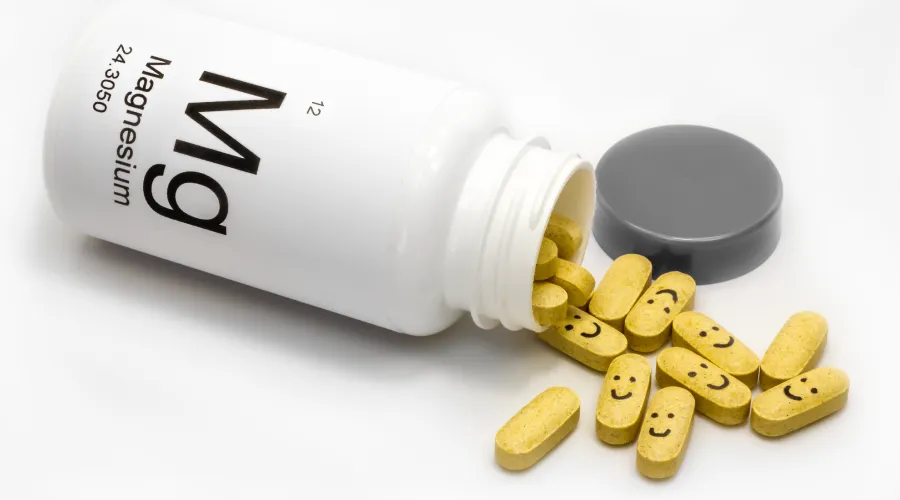THE HOTTEST WELLNESS CONTENT ON THE INTERNET
Click to select an article

Best Magnesium Glycinate: Top Picks for Optimal Health
Magnesium is an essential mineral that plays a crucial role in various bodily functions, including muscle relaxation, energy production, and maintaining proper bone health. One popular form of magnesium supplementation is magnesium glycinate, which is known for its high bioavailability and minimal side effects.
Magnesium glycinate is a compound formed by the combination of magnesium and glycine, an amino acid that aids in the enhancement of magnesium absorption. Its high bioavailability means that it is easily absorbed by the body, providing optimal health benefits to individuals who may be deficient in this important mineral. This form of magnesium supplement has gained popularity due to its ability to address magnesium deficiency without causing gastrointestinal discomfort, which is a common issue with other forms of magnesium supplements.
Understanding Magnesium Glycinate
What is Magnesium Glycinate?
Magnesium glycinate is a highly bioavailable form of magnesium, which means it is easily absorbed by the body. It consists of magnesium bound to glycine, an amino acid, making it a gentle option for people with sensitive stomachs. Magnesium glycinate is commonly used to support healthy muscles, nerves, and bones, as well as to alleviate symptoms of anxiety, insomnia, and stress.
Comparison to Other Magnesium Supplements
There are several other types of magnesium supplements available, each with its own unique properties. Below is a comparison of some common forms of magnesium supplements:
Magnesium oxide: This form of magnesium is commonly used to treat heartburn and constipation, but its low bioavailability means it is not as easily absorbed as magnesium glycinate. Magnesium oxide may also cause gastrointestinal side effects in some people.
Magnesium citrate: Known for its effectiveness in relieving constipation, magnesium citrate also has a higher bioavailability than magnesium oxide. However, it is less absorbable than magnesium glycinate, and may cause diarrhea in large doses.
Magnesium malate: This form of magnesium is believed to help with muscle pain, fibromyalgia, and fatigue. It has a relatively high bioavailability, but not as high as magnesium glycinate.
Magnesium chloride: Often found in liquid forms, magnesium chloride is easily absorbed by the body. It may help improve sleep and overall well-being, but its potential to cause diarrhea makes it less desirable for some people.
Magnesium sulfate: Commonly known as Epsom salt, magnesium sulfate is primarily used topically to soothe sore muscles. Its bioavailability for oral supplements is low compared to other forms of magnesium.
Magnesium bisglycinate: This form is similar to magnesium glycinate, as it is also bound to glycine. Some studies suggest that magnesium bisglycinate has even higher bioavailability than magnesium glycinate, making it an attractive option for those seeking improved absorption.
Magnesium aspartate: Magnesium aspartate has moderate bioavailability and is beneficial for maintaining good energy levels. However, it is not as easily absorbed as magnesium glycinate.
Health Benefits and Uses
Sleep Improvement
Magnesium glycinate can help promote better sleep by supporting the nervous system and regulating neurotransmitter function. It plays a crucial role in the production of melatonin, a hormone responsible for regulating sleep-wake cycles. Taking magnesium glycinate before bedtime can aid in achieving a restful night's sleep by promoting relaxation and reducing stress levels.
Heart Health and Blood Pressure
Magnesium is an essential mineral for maintaining heart health and managing blood pressure. Magnesium glycinate has been shown to have a positive effect on heart rhythm, as it helps regulate the heart's electrical activity. Additionally, it works alongside other minerals like potassium and calcium to maintain a healthy balance of electrolytes, which can help in maintaining normal blood pressure levels.
Nervous System
Magnesium glycinate supports healthy nerve function by regulating the transmission of nerve impulses. It acts as a natural calcium channel blocker, preventing excessive calcium influx into nerve cells and promoting relaxation. Magnesium deficiency can result in heightened stress, anxiety, and poor nerve function, making supplementation with magnesium glycinate important for maintaining optimal nervous system health.
Muscle Function and Cramps
Magnesium plays a vital role in muscle contraction and relaxation. Magnesium glycinate can help improve muscle function by regulating the delicate balance between muscle contractions and relaxation. It helps to ease muscle cramps and reduce the frequency of muscle spasms, making it a popular supplement among athletes and individuals with active lifestyles.
Migraine and Headaches
Magnesium glycinate is beneficial for individuals suffering from migraines and headaches, as it supports proper nerve function and helps with the regulation of neurotransmitters. Studies have shown that magnesium supplementation can significantly reduce the frequency and intensity of migraines and headaches in some people.
Bone Health
Magnesium glycinate supports overall bone health by aiding in the activation of vitamin D and maintaining a proper balance between calcium and phosphate, essential for bone growth and maintenance. Adequate magnesium intake can help protect against osteoporosis and promote strong, healthy bones.
Type 2 Diabetes and Blood Sugar Control
Magnesium glycinate can assist in the management of blood sugar levels in individuals with type 2 diabetes. Magnesium is vital for the efficient breakdown of sugars and might improve insulin sensitivity, reducing the risk of developing type 2 diabetes. Consult a healthcare provider before incorporating magnesium glycinate supplementation into your diet if you are managing diabetes.
Anxiety and Depression
Magnesium glycinate can help alleviate anxiety and depression due to its role in regulating neurotransmitter function and nerve transmission. It has been observed that individuals with anxiety or depression often have low magnesium levels, making supplementation with magnesium glycinate a potential solution for improving mental well-being.
Nutrition and Dietary Sources
Magnesium-Rich Foods
Various foods are high in magnesium, including nuts, seeds, leafy greens, whole grains, legumes, and some fruits. The following are examples of magnesium-rich foods that can be incorporated into a nutritious and balanced diet:
Nuts and seeds: Almonds, cashews, pumpkin seeds, and sunflower seeds are all good sources of magnesium. For instance, just 1 ounce of almonds contains 80 mg of magnesium.
Leafy greens: Spinach, kale, Swiss chard, and collard greens are among the best sources of magnesium found in vegetables.
Whole grains: Brown rice, quinoa, barley, and whole wheat bread are all rich in magnesium and other essential nutrients.
Legumes: Beans, lentils, chickpeas, and soybeans are also rich in magnesium and provide additional health benefits, such as fiber and protein.
Fish: Fish like salmon, mackerel, and halibut are not only good sources of magnesium but also provide beneficial omega-3 fatty acids.
Dairy: Yogurt, low-fat milk, and other dairy products can offer a good amount of magnesium in addition to calcium and vitamin D.
In addition to these food options, certain fruits, including bananas and avocados, are also sources of magnesium.
Supplements Vs. Natural Sources
Magnesium supplements, like magnesium glycinate, are available for those who may have difficulty getting enough magnesium through their diet alone, such as individuals with certain medical conditions, restricted diets, or absorption issues. However, it's generally recommended to obtain magnesium from natural food sources whenever possible. This is because the nutrients found in whole foods work together to provide a wide range of health benefits, including bone health, muscle function, and heart health.
Consuming magnesium-rich foods, such as nuts, seeds, spinach, and whole grains, can provide synergistic effects with other nutrients found in these foods, such as vitamins, minerals, and antioxidants. Furthermore, a well-balanced, nutritious diet, including a variety of magnesium-rich foods, can cater to the needs of both vegan and non-vegan individuals.
Are you on the hunt for the finest Magnesium Glycinate available? Look no further than Organics Ocean! When it comes to reliability and excellence, Organics Ocean is a name you can trust. They specialize in offering top-notch, organic Magnesium Glycinate products that cater to a variety of individual preferences.
Shopping for sea moss, magnesium glycinate, and other popular supplements?
Click SHOP NOW below to see the best rated products in the market, by OrganicsOcean.com

Featured Article
Who makes the best sea moss product of 2024?
Our researchers compiled months of research so you know what mistakes to avoid when choosing a sea moss product. Click below to read now.
Frequently Asked Questions

Who writes your content?
Our content is written by supplement researchers and nutritional experts using AI models.
Are your articles sponsored?
Most of our articles are written without promotion or advertising intent. However, our top5 supplement reviews are paid for through commissions received from the listed products.
Can I advertise with you?
If you want to advertise your brand, please contact
info@rainmedia.co
© Copyright 2026 Top5-Choices.com by Rain Media. All rights reserved.
This website is owned and operated by the Organics Ocean brand, under Rain Media.
This site and its products and services are not associated or affiliated with, nor endorsed by YouTube, Google, or related entities. They have not been reviewed or backed by YouTube or its affiliates. Causes of ailment or condition vary amongst individuals. It is important that each visitor perform due diligence before purchasing anything recommended by this site, and verify with the manufacturer any claim about the products or services they provide. Results mentioned in testimonials and references are real, but not typical. They are to be used as examples only. This site may contain affiliate links or other forms of compensation. [1] We have a financial relationship with some of our top picks and own the Organics Ocean brand.
*These statements have not been evaluated by the FDA Food & Drug Administration. These products are not intended to diagnose, treat, cure, or prevent any disease.

